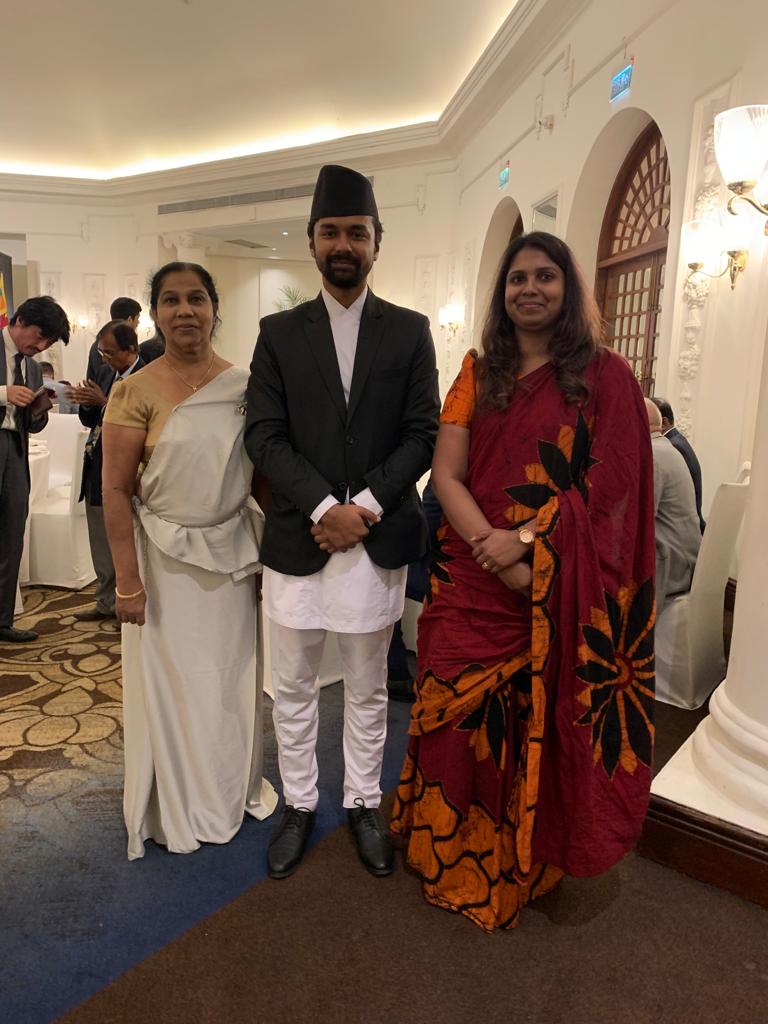SAARC Cultural Centre, Colombo is presenting its upcoming Second Session of the SAARC Talk Series 2025 on 25th April 2025 (Friday) at 3:00 pm (Sri Lanka Standard Time).
The lecture will be delivered by Prof. Thakur S Powdyel, Former Minister of Education, Royal Government of Bhutan.
Prof. Thakur S Powdyel will deliver his lecture on the topic “Our SAARC Universities: Re-claiming the Soul of Their Role”.
All are cordially invited. Please do spread the word.
Join us via Zoom : https://us06web.zoom.us/j/84314562491
Meeting ID: 843 1456 2491
We look forward to your participation and engaging discussions during this enlightening lecture.
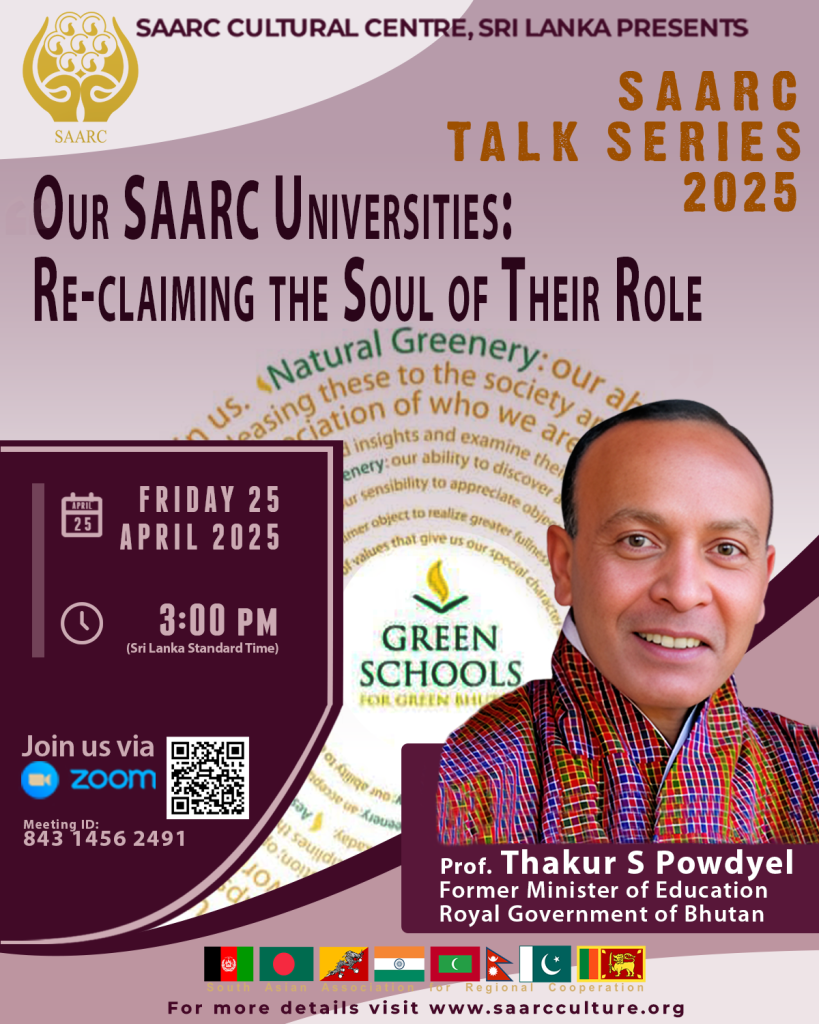
Job Overview
The SAARC Cultural Centre (SCC) is currently seeking a dedicated and experienced Personal Secretary to join our dynamic team. This position will play a crucial role in providing administrative support to senior management and ensuring the efficient operation of the Centre.
Applications are invited from Sri Lankan citizens for the following position.
Job Title: Personal Secretary to the Director SCC
Job Station: Colombo, Sri Lanka
Job Type: This Job is a contractual position with a duration of three years at a time, with the possibility of extension until the individual reaches 60 years of age, contingent upon satisfactory performance and conduct. (Note: The position is subject to a one-year probationary period, during which performance will be reviewed for permanent appointment.)
Age: Below 45 years
Responsibilities:
• Manage schedules, appointments, and travel arrangements for senior management.
• Organize and maintain files, records, and databases.
• Prepare and edit correspondence, reports, and presentations.
• Act as the point of contact between executives, employees, clients, and other external partners.
• Handle confidential information with discretion and professionalism.
• Perform various administrative tasks to support daily operations.
Education Qualifications and Experience:
• Degree or higher qualification in Administration or Human Resource or relevant field;
• Proven 07 years of experience as a Personal Assistant or in a similar role;
• Strong verbal and written English communication abilities;
Preferred:
• Diploma or higher qualification in Secretarial studies or a relevant filed
Skills:
• Clear and confident communication (phone, in-person, video calls).
• Strong writing skills (emails, memos, reports).
• Active listening to understand and deliver accurate messages.
• Effective task prioritization and time management.
• Organizing meetings, appointments, and travel.
• Maintaining organized physical and digital records.
• Attention to detail to ensure error-free documents and appointments.
• Proficiency in Microsoft Office Suite, Google Workspace, and email systems.
• Experience with calendar and scheduling tools (Outlook, Google Calendar).
• Accurate data entry and management.
• Professional interaction with internal and external stakeholders.
• Handling inquiries and requests politely and professionally.
Recruitment Procedure:
– Shortlisted applicants will be required to sit for a written test and a structured interview designed to assess the subject knowledge of the candidates
– Required reference checks will be conducted by the SAARC Cultural Centre to ascertain the authenticity of the information listed in the CVs
Salary and other allowance:
– US$265-6×5-295(EB)-9×5-340(EB) plus other allowances (House rent, Medical allowance, Conveyance allowance) monthly as per the harmonized rules of the SAARC Regional Centres, Payable in Sri Lankan Rupees.
Application Process:
– Interested candidates are invited to view the full job description in https://saarcculture.org/vacancy-announcement-personal-secretary-to-the-director-gss-i/.
– A cover letter and a copy of detailed resume with two non-related referees should be sent via registered post or fill the following Google form.
Google Form Link: https://forms.gle/v1QiZLH3VQb1dfjg8
– All registered post application should be addressed to the Director, SAARC Cultural Centre, No: 224, Baudhaloka Mawatha, Colombo 07.
– Application deadline: 15 March 2025
Selection Process:
– Only candidates who have been short-listed based on their qualifications and experience will be invited to participate in the written examination, followed by an interview.
– All original education certificates and documents verifying experience must be brought to the interview.
Director
SAARC Cultural Centre
No. 224, Bauddhaloka Mawatha, Colombo 7
Web:www.saarcculture.org
Job Overview
SAARC Cultural Centre (SCC) is looking for a dedicated and experienced Peon (GSS VI) to join our vibrant team. This position will be responsible for providing essential administrative support to the Director and Senior Management, ensuring the efficient day-to-day operation of the Centre.
Applications are invited from Sri Lankan citizens for the following position:
Job Title: PEON – GSS CATEGORY – VI
Job Station: Colombo, Sri Lanka
Job Type: This Job is a contractual position with a duration of three years at a time, with the possibility of extension until the individual reaches 60 years of age, contingent upon satisfactory performance and conduct.
(Note: The position is subject to a one-year probationary period, during which performance will be reviewed for permanent appointment.)
Age: Below 35 years
Education Qualifications:
– G.C.E. (O/L) with 06 subjects
Work Experience:
– A minimum of 3 years’ experience in the relevant field
Skills:
– Ability to communicate effectively with staff, visitors, and vendors in English
– Time Management: Ability to prioritize and handle multiple tasks efficiently.
– Dependable, punctual, and trustworthy in handling confidential materials.
– Good physical stamina and ability to perform various manual tasks.
– Proactive attitude and willingness to learn.
Key Responsibilities:
– Cleaning and maintaining the office premises, including desks, floors, and common areas.
– Ensuring that supplies like water, soap, and toilet paper are available in the office.
– Delivering official letters, documents, and parcels to various departments or external offices.
– Collecting mail and documents from other offices or individuals.
– Assisting with basic administrative tasks like photocopying, filing, and maintaining records.
– Supporting office staff with any day-to-day tasks as needed.
– Running errands, such as going to the bank, post office, or other offices on behalf of the organization.
– Assisting in the procurement and stocktaking of office supplies like stationery, paper, and other consumables.
– Ensuring supplies are replenished when needed.
– Providing general assistance to office executives or other staff members, such as bringing them files or helping with basic tasks.
– Handling confidential documents or tasks in a trustworthy manner.
– Moving office furniture or other equipment as required.
– Receiving deliveries and managing vendor relations when they come to the office for supplies or services.
– Performing any other duties as assigned by senior staff members to ensure smooth functioning of the office.
Salary and other Allowance:
US$ 130-2×5-140(EB) 4×5-160(EB) plus other allowances (House rent, Medical allowance, Conveyance allowance) monthly as per the harmonized rules of the SAARC Regional Centres, Payable in Sri Lankan Rupees.
The medium of work: English
Application Process:
– Applicants who possess the above requisite qualifications should forward ‘their applications together with copies of educational and professional qualifications, details of work experience and names and addresses of 02 non-related referees.
– All applications should be sent by registered post or fill the relevant Google forms
– Application deadline: 15 March 2025
– Google Form Link: https://forms.gle/G1LrMXqdn8W3Md2o9
Selection Process:
– Only candidates who have been short-listed based on their qualifications and experience will be invited to participate in an interview.
– All originals education Certificates and documents to prove experience should be brought to the interview.
Director
SAARC Cultural Centre
No. 224, Bauddhaloka Mawatha, Colombo 7
Web: www.saarcculture.org
Job Overview
SAARC Cultural Centre (SCC) is currently seeking a dedicated and experienced Personal Secretary to join our dynamic team. This position will play a crucial role in providing administrative support to the Director and Senior Management and to ensure the smooth operation of the Centre.
Applications are invited from Sri Lankan citizens for the following position.
Job Title: Personal Secretary to the Director SCC
Job Station: Colombo, Sri Lanka
Job Type: Three years on contractual basis (Extendable, subject to the satisfactory performance).
(Note: This appointment shall be subject to a probationary period of one year)
Age: Below 45 years
Responsibilities:
Education Qualifications
Work Experience
Recruitment Procedure
Salary and other allowance
US$265-6×5-295(EB)-9×5-340(EB) plus other allowances (House rent, Medical allowance, Conveyance allowance) monthly as per the harmonized rules of the SAARC Regional Centres, Payable in Sri Lankan Rupees.
Application Process
Interested candidates are invited to view the full job description in https://saarcculture.org/vacancy-announcement-personal-secretary-to-the-director-gss-i-contract-basis/ .
A cover letter and a copy of detailed resume with two non-related referees should be sent via registered post or fill the following Google form. All registered post applications should be addressed to the Director, SAARC Cultural Centre, No: 224, Baudhaloka Mawatha, Colombo 07.
Only short-listed applicants will be called for an interview.
Application deadline: 10th September 2024
Google Form Link: https://forms.gle/eio9oPBF4wN1dkAs5
SAARC Cultural Centre, Colombo is presenting its upcoming Fifth Session of the SAARC Talk Series 2024 on 19th June 2024 (Wednesday) at 3:00 pm (Sri Lanka Standard Time). The lecture will be delivered by Mr. Amer Bazl Khan, Director, MaritimEA Research, Karachi, Pakistan
Mr. Amer Bazl Khan will deliver his lecture on the topic “Documenting the Maritime Heritage of Pakistan”.
The presentation is open to public. To attend kindly register at the link given below.
Please click here to register
Meeting link: https://meet.google.com/xrn-jtsv-drm
Do spread the word. We look forward to your participation and engaging discussions during this enlightening lecture.
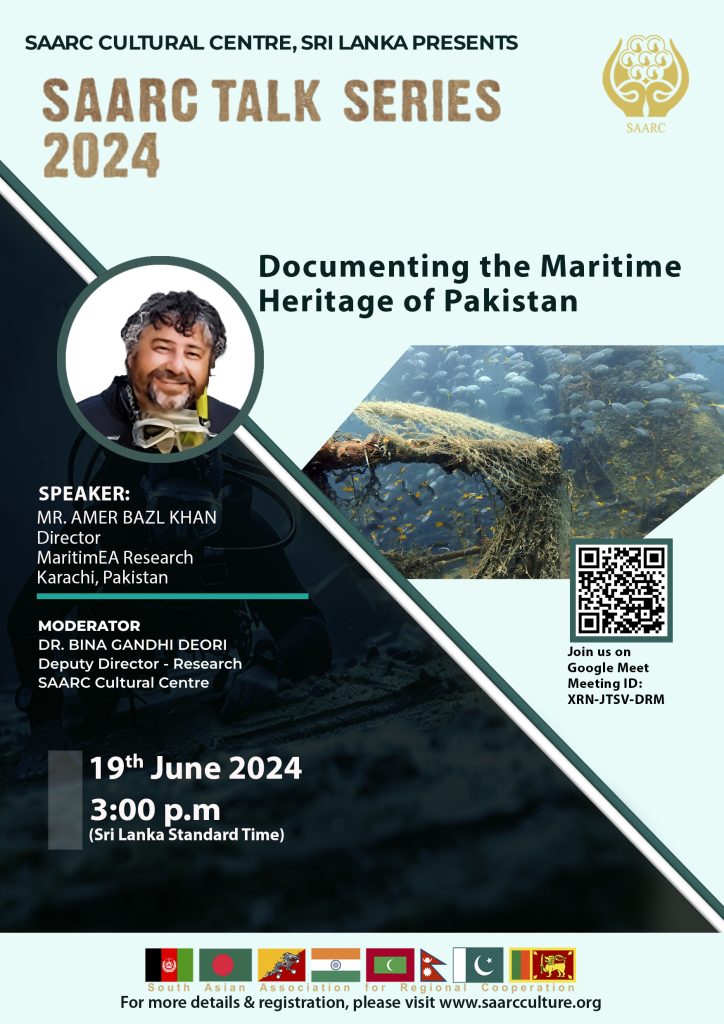
SAARC Symposium on Cultural Heritage for Sustainable Future for 2024 was approved by the Thirteenth Meeting of the Governing Board of the SAARC Cultural Centre held from 28th to 29th November 2023 and at the Fifty-Ninth Session of the Programming Committee Meeting held in Kathmandu from 6th to 7th March 2024.
Heritage, both cultural and natural has become very important in the modern world and made the world smaller via easy access to information, fast communication and international travel due to the advance of transportation systems. Tourism, local, national and global has become a significant part of the economy and this has led to heritage sites becoming very popular. This has led to hordes of tourists visiting these sites, sometimes beyond the capacity of the site and invariable leading to the damage and destruction of heritage sites. Cultural heritage sites in South Asia are a part of the religious, social and cultural lives of the population and in many cases, living heritage sites where large numbers of traditional visitors and modern tourists congregate, increased pollution, environmental degradation etc., have aggravated the issues faced by the living heritage sites. The activities associated with the heritage sites for decades, especially the Intangible Cultural Heritage (ICH) are also threatened, especially during and after the global pandemic.
In this rapidly changing world, heritage has become a centre for tourism and development of economy-based tourism disregarding the sustainability of heritage, especially the fragile and almost disappearing intangible cultural heritage. This has led to intangible cultural heritage becoming a tourist-oriented commodity with the social, cultural and religious values associated with, disappearing from communities and culture. This symposium is planned to address these issues and to preserve heritage and heritage values while ensuring the economic and social benefits are shared among local communities.
The symposium will be for two (2) days followed by one (1) day cultural tour. Papers for the symposium will be invited from academics from universities, institutes, independent researchers, heritage practitioners, etc., from the honoured Member States.
The SAARC Symposium aims to address the following research questions:
2.1. How can heritage conservation contribute to sustainable development goals in the SAARC Region?
2.2. In what ways can heritage be used to promote Regional Unity?
2.3. What measures can be taken to ensure the preservation of heritage sites amidst increasing tourist activities?
2.4. How can communities balance the need to preserve ICH practices while adapting to modern challenges and changes?
2.5. In what ways can indigenous communities be empowered to share their knowledge for sustainable development initiatives?
2.6. What strategies can be implemented to mitigate the effects of climate change on heritage conservation?
2.7. How has social media transformed the way we interact with cultural heritage?
The main objectives of the SAARC Symposium are as follows:
3.1. To create a platform to bring together interdisciplinary Regional professionals to discuss key issues and debates relating to the protection of heritage for a sustainable future;
3.2. To identify ways in which communities can actively participate in sustainable development initiatives while preserving their cultural heritage;
3.3. To promote Regional Unity through intercultural dialogue;
3.4. To examine the benefits and drawbacks of heritage tourism for local communities;
3.5. To investigate the effective ways to safeguard and transmit ICH practices to future generations;
3.6. To examine how indigenous knowledge systems can promote sustainable living practices;
3.7. To explore how social media platforms can be utilised to engage diverse audiences in heritage-related discussions.
3.8. To bring out publication in the form of the Book of Abstracts of Cultural Heritage for Sustainable Future.
The SAARC Symposium will be a blend of theoretical discussions and practical case studies, making it an enriching and interactive experience for the participants.
4.1. Speakers will do oral presentations to share their expertise and insights on the subject.
4.2. Assign session chairs to introduce speakers, manage Q & A sessions and ensure the smooth flow of the symposium.
4.3. Virtual options will be available for those participants unable to attend physically.
The expected outcomes of the SAARC Symposium are the following:
5.1. Identify challenges and opportunities in balancing cultural preservation with sustainable development practices.
5.2. Creation of new partnerships and collaborations between organizations working in the fields of culture, heritage and sustainability within the SAARC Region.
5.3. Dissemination of best practices, case studies and research findings within the SAARC Region through the publication of papers presented at the Symposium and uploading them online at the SAARC Cultural Centre website for free global access.
6.1. Heritage and Sustainable Development
Heritage and sustainable development go hand in hand. Preserving heritage is vital for sustainable development as it provides a connection to the past and paves the way for a better future. By integrating heritage conservation into development strategies, we can ensure the longevity of both tangible and intangible heritage for future generations. For this session, we seek contributions that illustrate this interconnectivity between Heritage and Sustainable Development.
6.2. Heritage and Peace
Heritage has the power to build bridges and foster understanding among different communities. By promoting mutual respect and understanding for heritage, conflicts can be reduced and a more peaceful and inclusive society can be created. For this session, we are looking for papers that illustrate how heritage can play a crucial role in promoting peace and harmony.
6.3. Heritage Tourism
Heritage Tourism has become increasingly popular in recent years as it offers an opportunity to showcase cultural heritage and provides economic benefits to the local communities. In this session, we seek papers that address how promoting responsible tourism practices, heritage sites can be preserved for future generations.
6.4. Intangible Cultural Heritage (ICH) Practices for Communities
ICH practices play a significant role in shaping the identities of communities. By recognizing and safeguarding ICH practices, we can foster a sense of pride and belonging among communities. In this session, we seek papers that illustrate how, by safeguarding and promoting these practices, communities can maintain their cultural continuity.
6.5. Indigenous Knowledge for Sustainable Development
Indigenous knowledge has proven to be a valuable resource for sustainable development, especially in the face of environmental challenges. In this session, we encourage research papers that show how incorporating indigenous wisdom into development plans, we can promote a more harmonious relationship between humans and the environment.
6.6. Heritage and Climate Change
Climate Change poses a significant threat to heritage sites. Rising sea levels, global warming. etc. pose a significant threat to our heritage sites. In this session, we welcome papers that address the impact of climate change on heritage and how we can work towards developing adaptive strategies to protect these valuable assets for future generations.
6.7. Role of Social Media for Heritage
In the digital age, social media has emerged as a powerful tool for promoting heritage. Social media platforms have transformed the way we engage with heritage. In this session, we seek papers that explore the role social media plays in raising awareness in preserving heritage resources.
7.1. Officially Nominated Participants from the Member States
The SAARC Cultural Centre invites all Member States to send a maximum of Five (5) Official Nominations of experts working on the abovementioned theme from their respective countries for the SAARC Symposium. The participants may be selected from diverse disciplines among academics and policy-makers including but not limited to archaeologists, art historians, conservators, curators, museologists, anthropologists, sociologists, and heritage site managers. The SAARC Cultural Centre would provide local hospitality (Hotel accommodations on a full board basis) and local transport to all Official Nominees of the SAARC Member States.
7.1.1. The airfare of the Official Nominees of the SAARC Member States is to be borne
by the respective Member States.
7.1.2. The Host Member State can nominate a maximum of 15 Official Nominees. All Official Nominees of the Host Member State will be invited to participate in the Cultural Tour and provided with the symposium kit. Official Nominees from the Host State will be provided with accommodation if required depending on the availability of the budget.
7.1.3. All Official Nominees must present a paper at the symposium.
7.2. Other Participants from the Member States
Category A
7.2.1. The SAARC Cultural Centre would also accept the participation of other experts from the Member States (other than the Official Nominees of the respective SAARC Member States).
7.2.2. Applications should be sent through the respective Ministry of Foreign Affairs/Ministry of External Affairs to the SAARC Secretariat.
7.2.3. The selection of Other Participants (Category A) will be at the discretion of the SAARC Cultural Centre based on the availability of space and the relevance of the abstract to the symposium themes.
7.2.4. Air Travel is to be borne by the participant and SCC will provide accommodation (depending on availability), Symposium kit and the cultural tour.
Category B
7.2.5. Participants from the Host Member State (the Republic of India) where the symposium is held can participate. (It is anticipated that researchers, academics, etc., from the host city will present papers at the symposium).
7.2.6. Other Paper Presenters (Category B) from the Host Member State (the Republic of India) will not be provided with travel and accommodation.
7.2.7. Other Paper Presenters (Category B) will receive the symposium kit and meals during the symposium.
7.2.8. Virtual Participants -Participants unable to attend the symposium physically can join virtually.
7.2.9. Officials of the SAARC Cultural Centre-The Director, Deputy Director-Research (officiate the symposium) and two other officials from SCC will attend this event.
7.3. Additional Information
7.3.1. Registration Forms of all participants (Official Nominees, Other Participants Category A and B) must be received through the respective Ministry of Foreign Affairs/Ministry of External Affairs of the Member State to the SAARC Secretariat.
7.3.2. The Language of the symposium is English. All abstracts and presentations should be in English.
7.3.3. The SAARC Cultural Centre reserves the right to select the Other Participants (in Category A and B) for the symposium.
7.3.4. The symposium facilities (delegate kit, tea, working lunch) as well as invitations to special events and the field trip would be extended to all participants.
7.4. Nomination Process
7.4.1. The Official Nominees will be selected by each Member State comprising leading academics, archaeologists and other experts from the Member States. Official Nominations should be submitted to the SAARC Secretariat, with the Registration Form (Annexure 1) and the Format for the Submission of State Papers/Abstracts (Annexure 2) attached (or downloaded from the SCC website) and the details requested below.
7.4.2. All Other Participants (Category A) from each Member State should forward their information (including Annexure 1 & Annexure 2) through the respective Foreign Ministries to the SAARC Secretariat in Kathmandu.
7.4.3. An advance copy can be emailed to sccpublications@gmail.com or dd-research@saarcculture.org.
7.5. All Participants should include:
7.5.1. Full Name and Affiliation of the Person and other details requested in the Registration Form attached herewith. (Registration Form – Annexure 1)
7.5.2. Detailed CV of the participant.
7.5.3. Scanned copy of Passport / Scanned copy of National Identification from the Participants of the Host Member State.
7.5.4. An Abstract (350 words) of the proposed paper. The Abstract should be submitted in the Submission Form attached herewith. (Format for the Submission of Abstracts-Annexure 2)
7.5.5. The participants are requested to submit their full papers by 20th August 2024 and prepare a PowerPoint Presentation of 15 minutes maximum to be presented during the SAARC Symposium.
7.6. Time Schedule for the Symposium Paper Submissions
Call for Papers 1st May 2024
The deadline for accepting Nominees & Participants 30th June 2024
Selection of Abstracts & Informing Participants 20th July 2024
Submission of full papers to be published before the symposium 20th August 2024
Symposium and Cultural Tour Dates (TBA) October 2024
(TBA)October 2024
India
Dr. Bina Gandhi Deori
Deputy Director (Research)
Email: dd-research@saarcculture.org
Download PDF Documents : Annexure 1 & Annexure 2
Download Word Document : Annexure 1 & Annexure 2
SAARC Research Project Grants on Intangible Cultural Heritage for Food Storage in the SAARC Region was approved by the Thirteenth Meeting of the Governing Board of the SAARC Cultural Centre held from 28th to 29th November 2023 and at the Fifty-Ninth Session of the Programming Committee Meeting held in Kathmandu from 6th to 7th March 2024.
The Research Grants provide an opportunity for scholars, and researchers to conduct in-depth studies on traditional food storage/preservation practices used by different cultures within the SAARC Region. By studying these practices, we hope to better understand their effectiveness and potential for modern-day applications and environmentally friendly and chemical-free food.
The Research Grants will provide an opportunity for the Member States to explore new research areas along the intangible cultural heritage for food storage/preservation practices in the SAARC Region. Research findings can help the integration of these traditional practices into modern-day food storage/preservation systems for a more sustainable future.
Research and documentation of these traditional storage/preservation practices as intangible cultural heritage can contribute to the preservation of cultural diversity, promote sustainability, enhance food security and potential economic benefits for the local communities. This will help in preserving the cultural identity of traditional food storage and preservation, and promote diversity and understanding within the SAARC Region.
The Research Grant aims to address the following research questions:
2.1. What are the benefits of preserving traditional food storage/preservation and intangible cultural heritage for future generations?
2.2. How can traditional knowledge and modern technology be integrated to develop more efficient and sustainable food storage/preservation practices in the SAARC Region?
2.3. How can the traditional food storage/preservation methods contribute towards sustainable environments?
2.4. What are the key challenges regarding traditional food storage/preservation in the SAARC Region and how can these challenges be addressed to prevent food waste and improve food security?
2.5. How can the impact of modernization and globalization on traditional food storage/ preservation practices be changed?
Through the Research Grants, the SAARC Cultural Centre aims to:
3.1. Encourage new research in the field of traditional food storage/preservation practices in the SAARC Region;
3.2. Facilitate new approaches to study traditional food storage/ preservation practices and explore ways to revive and preserve endangered food storage/ preservation practices;
3.3. Present innovative measures for the conservation and preservation of traditional food storage/preservation practices;
3.4. Identify the challenges and threats communities face in preserving the traditional food storage/preservation practices and how can they overcome them.;
3.5. To bring out the publication of the Research Final Reports and to be uploaded to the SAARC Website for free global access.
The SAARC Cultural Centre invites academics and researchers from Member States to submit detailed Research project proposals (along with a detailed budget breakdown for US$ 3,000) for new and innovative short-term research projects on the ICH and Traditional Food Storage in the SAARC Region.
The selection of research project proposals will be carried out by a Team of Experts selected by the SAARC Cultural Centre. The first instalment of the grant (US$ 1500) will be made at the commencement of the Research Project. The final payment is subject to the review of the final presentation made to a team of experts via video conferencing and submission of the final research paper. Any suggestions/recommendations made by the SCC Team of Experts at this stage are to be included in the research process by the respective researchers.
Each researcher will be required to submit a Research Report on Academic Research quality to be published in the “ICH and Traditional Food Storage Practices in SAARC Region” publication series of the SAARC Cultural Centre.
5.1.Traditional Techniques and Knowledge of Food Storage/Preservation
The traditional techniques of food storage/preservation have been developed over centuries to preserve food for a longer period. These techniques vary from region to region like smoking, drying, pickling, fermenting etc. This session seeks contributions that explore the different methods of food storage/preservation practised in the SAARC Region.
5.2.Intersections of Food Storage/Preservation Practices with Cultural Identity and Heritage
Food storage/preservation practices are deeply intertwined with cultural identity and heritage preservation. This session encourages papers that reflect the values, beliefs and traditions of a community, making them an integral part of cultural heritage.
5.3.Oral Traditions Related to Food Storage/Preservation Methods
Oral traditions related to food storage/preservation methods are an integral part of cultural heritage. This session welcomes papers exploring the oral traditions that give insight into the cultural significance of food storage/preservation practices and their role in the community.
5.4.Sustainability and Resilience of Traditional Food Storage/Preservation Practices in the Modern World
Traditional food storage/preservation practices have stood the test of time and have proven to be sustainable and resilient in the modern world. This session seeks contributions that highlight these aspects of traditional food storage/preservation practices.
5.5. Gender Roles and Traditional Food Storage/Preservation
Gender roles have a significant impact on traditional food storage/preservation practices. In many cultures, women are responsible for processing and storing food. In this session, we seek contributions that address the division of labour that has resulted in different techniques and methods of food storage/preservation.
5.6. Revival and Preservation of Endangered Food Storage/Preservation Practices
There is a recent trend of revival of these practices due to their cultural significance and sustainability. Efforts are being made to preserve and promote endangered food storage/preservation practices to keep their cultural heritage alive. In this session, we welcome papers that examine the role played by various organizations and communities to preserve and promote endangered food storage/preservation practices.
5.7. Community-based Approaches to Safeguarding Intangible Cultural Heritage Related to Food Storage/Preservation
The community-based approach to safeguarding intangible cultural heritage related to food storage/preservation is crucial for preserving these practices. Organisations and communities are coming together to document and promote traditional food storage/preservation practices. This session welcomes papers that explore active community participation in knowledge sharing.
6.1. Academics, Scholars and Researchers of the SAARC Member States.
6.2. Academics, Scholars and Researchers who have received Research Grants from the SAARC Cultural Centre previously within the last 5 years will not be eligible.
7.1. Format for the Application is attached herewith as Annexure-1 (to be filled for both Seminar and Research Grant and Annexure-3 (to be filled only for the Research Grant) and available at the SAARC Cultural Centre website. (www.saarcculture.org).
7.2. All sections of the application are to be completed (Part- A, B and C). Incomplete applications will not be considered.
7.3. Each Member State can forward any number of Research Proposals for consideration.
7.4. Research Proposals should be for innovative and new research based on the themes mentioned above or on a new theme related to Intangible Cultural Heritage for Food Storage in the SAARC Region.
7.5. Application forms must be channelled through the respective Ministry of Foreign/External Affairs of the Member States and the SAARC Secretariat to SCC.
7.6. An advance copy can be emailed to the SAARC Cultural Centre- sccpublications@gmail.com or dd-research@saarcculture.org
7.7. All Research Proposals should reach the SAARC Cultural Centre by 20th June 2024.
7.8. The Research Grant will be distributed in 2 instalments – The first instalment (US$ 1500) at the commencement of the project and the final instalment (US$ 1500) after the submission of the Final Report.
7.9. The final payment is subject to the review of the final presentation made to a Team of Experts via Video Conferencing and submission of the final research paper. Any suggestions/recommendations made by the SCC Team of Experts at this stage should be included in the research process by the respective researchers.
7.10. At the end of the Research Project each researcher will be required to submit a research report of academic research quality.
Deadline for Accepting Research Proposals – 20th June 2024
Selection of Research Proposals – 30th June 2024
Commencement of the Project – 10th July 2024
Mid-Term Review of the Research to the Team of Experts – (TBA) October 2024
Final Report – 20th December 2024
Dr. Bina Gandhi Deori, Deputy Director (Research)
Email: dd-research@saarcculture.org/sccpublications@gmail.com
Download PDF Documents : Annexure-1 & Annexure-3
Download Word Document : Download
SAARC Cultural Centre, Colombo is presenting its upcoming Third Session of the SAARC Talk Series 2024 on 13th March 2024 (Wednesday) at 3:00 pm (Sri Lanka Standard Time). The lecture will be delivered by Mr. Samten Yeshi, Researcher, VAN MANEN Project, Leiden Institute for Area Studies, Leiden University, The Netherlands.
Mr. Samten Yeshi will deliver his lecture on the topic “The Relationship between Culture and Nature: A Bhutanese Perspective”.
The presentation is open to public. To attend kindly register at the link given below.
Please click here to register
Meeting link: https://meet.google.com/wps-jzsc-eam
Do spread the word. We look forward to your participation and engaging discussions during this enlightening lecture.
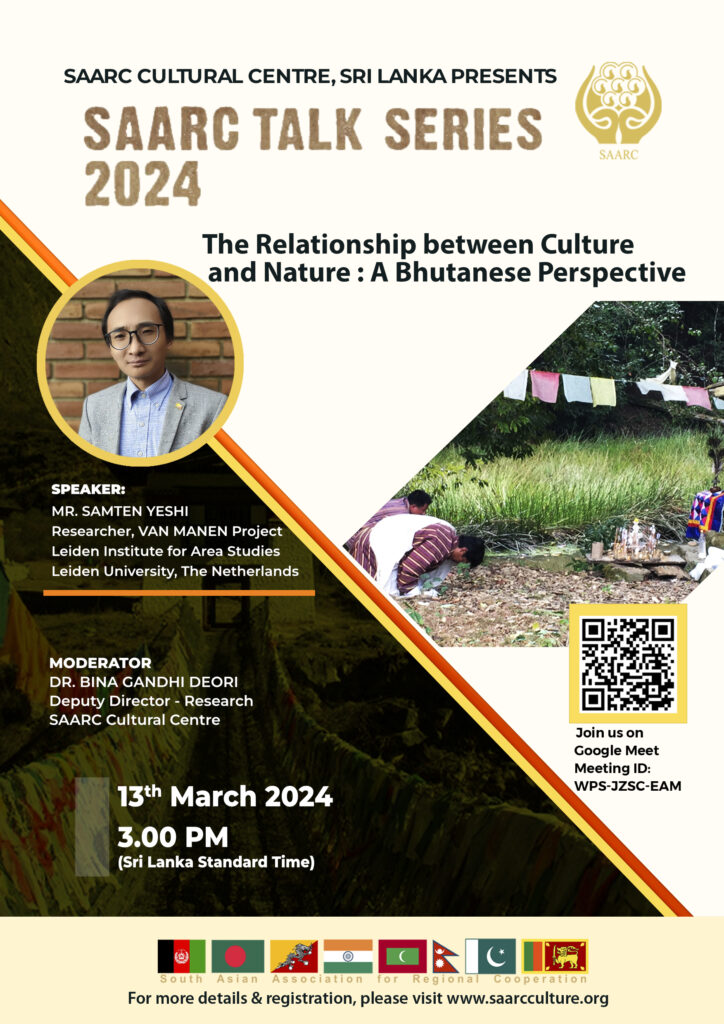
Sri Lanka India Society, Colombo organized a commemorative dinner to celebrate the 77th Indian Independence Day on the 23rd September 2023 at the Taj Samudra. Prime Minster of Sri Lanka Hon. Dinesh Gunawardena was the Chief Guest of the event. Director of the SAARC Cultural Centre Mrs Renuka Ekanayake delivered the keynote address. In her speech, Ms. Ekanayake highlighted the historical links between Sri Lanka and India and how these links over the centuries have cemented the bonding between the two countries. In her speech she also thanked Mr. Kishore D Reddy, President, SLIS for the kind invitation.
His Lordship Chief Justice Hon. Jayantha Jayasuriya, High Commissioner of India to Sri Lanka H.E Gopal Baglay, Attorney General Hon. Sanjay Rajaratnam, Hon. Minister Manusha Nanayakara, Governor of the Eastern Province Hon. Senthil Thondaman, Deputy High Commissioner Dr Satyanjal Pandey and Member of Parliament Hon. Yadamini Gunawardena, graced the occasion. Dr Bina Gandhi Deori, Deputy Director-Research, SAARC Cultural Centre also attended the event among other dignitaries.
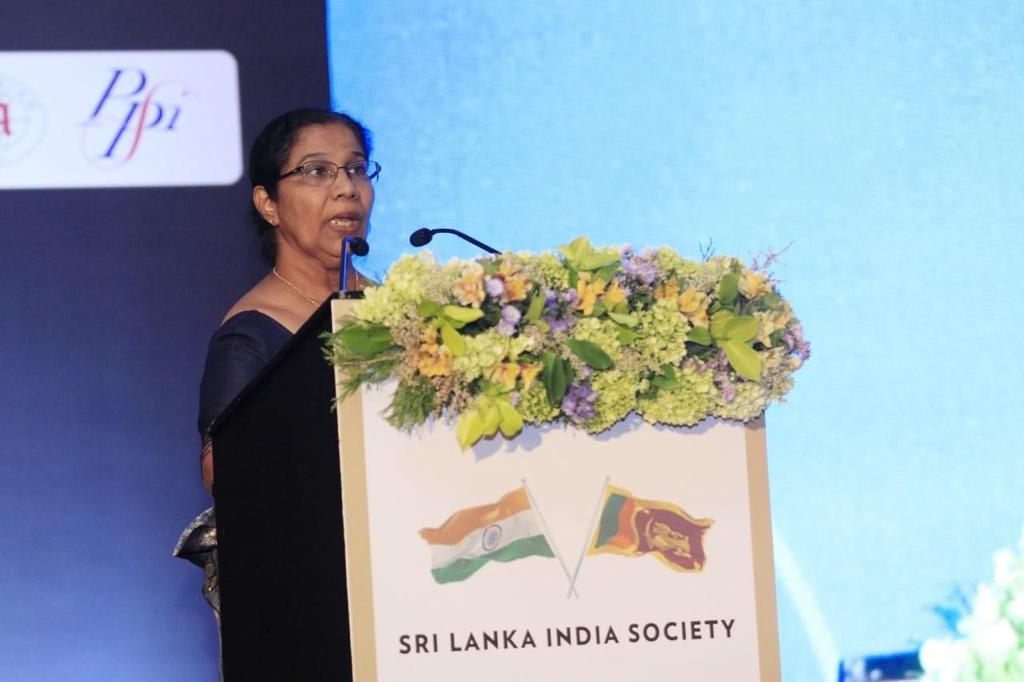
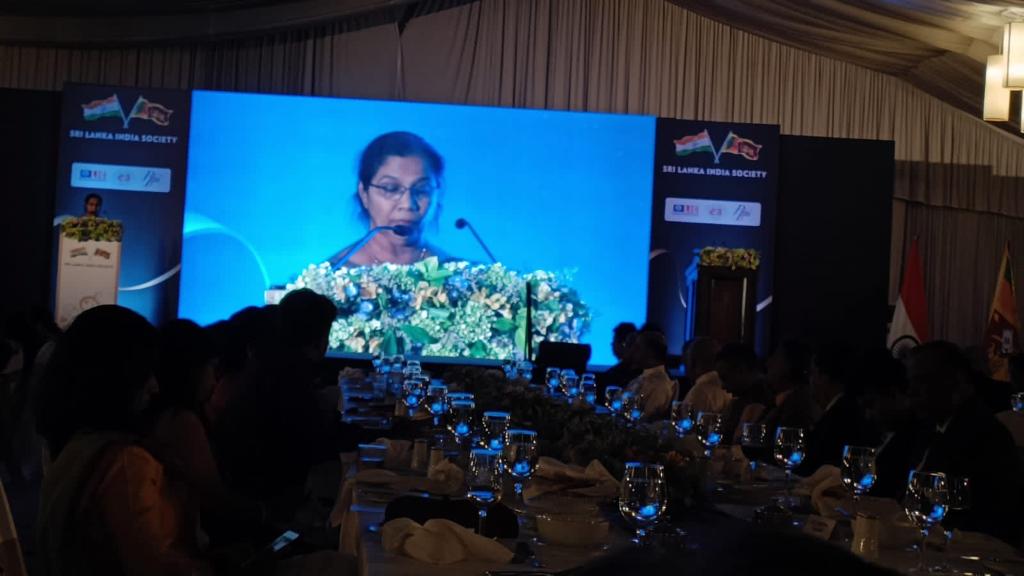
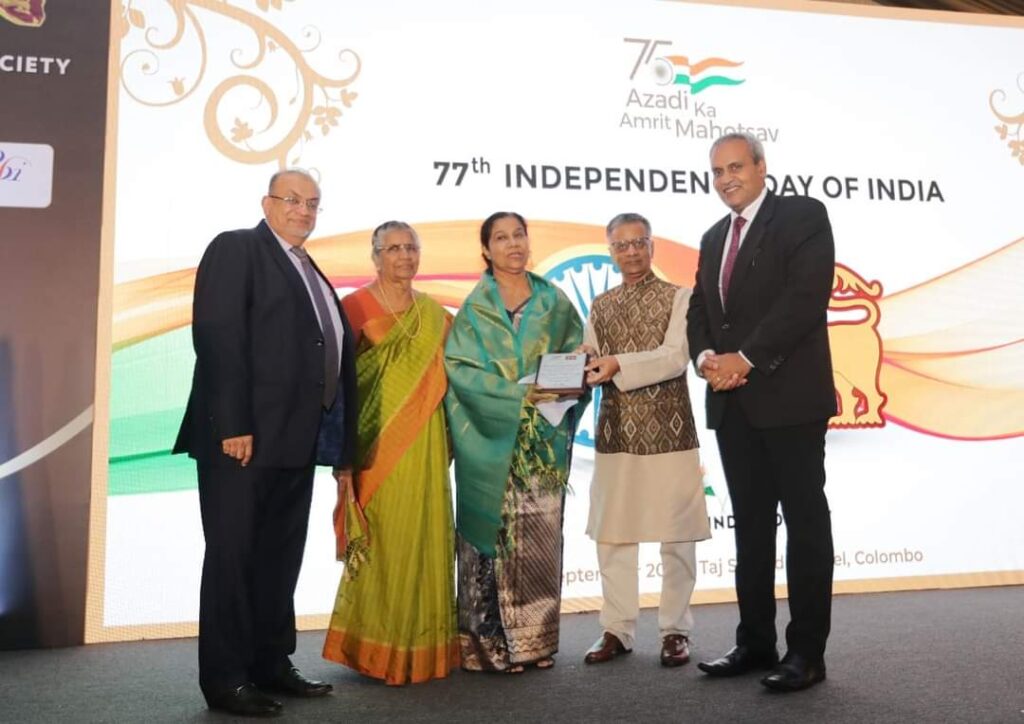
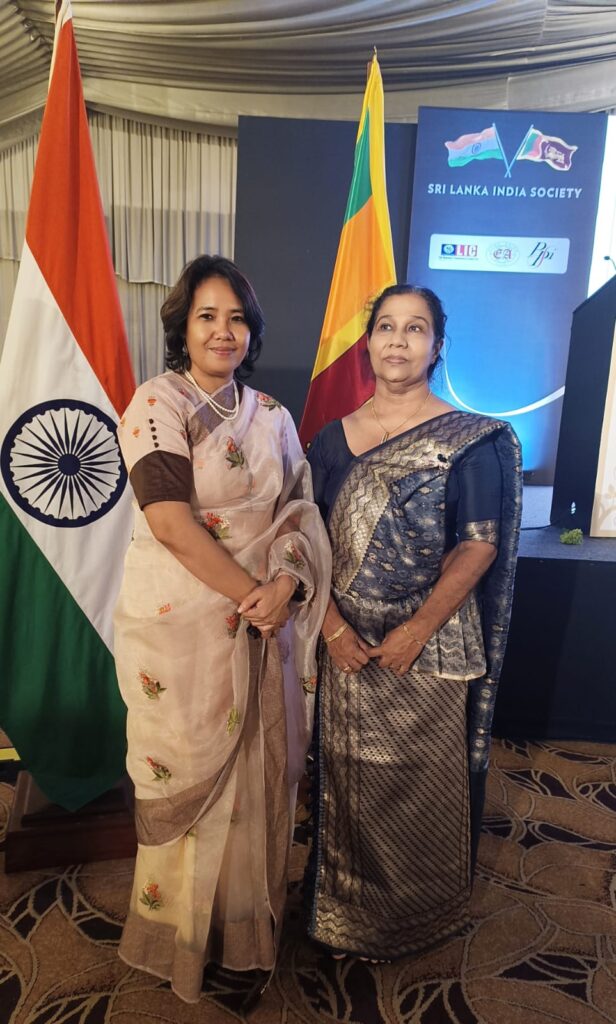
On the occasion of the National Day of Nepal, Director SAARC Cultural Centre, Ms Renuka Ekanayake was invited for dinner hosted by the Ambassador of Nepal H.E. Mr. Bashu Dev Mishra on the 20th September 2023 at Galle Face Hotel. Director, SAARC Cultural Centre extended her heartfelt wishes on the occasion.
(Pic: Director of SAARC Cultural Centre, Ms Renuka Ekanayake, Second Secretary of Nepal Embassy, Mr. Biswash Bhatta and Ms. Diana Perera, Assistant Director, SAARC Division, Ministry of Foreign Affairs, Sri Lanka).
